
The newsletter of UCL Library Services - Issue 21: Spring term, 2009
Inside this issue
|
Editorial board members:
Elizabeth Chapman, Chris Carrington, Deborah Furness, Elizabeth Lawes, Grazia Manzotti, Dayaram Nakrani, Ruth Russell & Margaret Stone.
:: Contact the editorial board
|
* Top Tip! *
 We have a lot of dictionaries in many languages in all of our libraries and in our reference and subject collections but did you know that we have some online as well? Have a look at the Oxford English Dictionary and Oxford Language Dictionaries Online in our Databases A-Z next time you need one while working at a PC.
We have a lot of dictionaries in many languages in all of our libraries and in our reference and subject collections but did you know that we have some online as well? Have a look at the Oxford English Dictionary and Oxford Language Dictionaries Online in our Databases A-Z next time you need one while working at a PC.
Contact library@ucl.ac.uk if you have any suggestions for new dictionaries that you think we should acquire.
Debs Furness
|
Welcome
The themes of issue 21 of this Newsletter are ones of continued development and growth in the provision of library and information services.
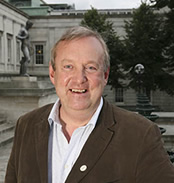 Fittingly, the 200th anniversary of Charles Darwin's birth and the 150th of On the origin of species coincide with the addition of three of UCL's natural history collections to the UCL Library Catalogue.
Fittingly, the 200th anniversary of Charles Darwin's birth and the 150th of On the origin of species coincide with the addition of three of UCL's natural history collections to the UCL Library Catalogue.
16 February 2009 is an important date as it marks the launch of the UCL Archives database at http://archives.ucl.ac.uk. This catalogue describes the rich and varied archive holdings in UCL Special Collections and in UCL SSEES. With the launch of this new service, it is possible to:
- Search both the UCL Special Collections and the UCL SSEES archival catalogues and lists, using a variety of different search options
- Search 688 descriptions at collection level for UCL Special Collections, and 193 descriptions at collection level for UCL SSEES
- Explore the catalogues of major collections including George Orwell and Sir Francis Galton at file level
The UCL Archives database is available remotely at any PC or terminal connected to the Internet anywhere in the world. The launch of this database will provide major support to research, teaching and learning. The database will continue to be enlarged with more detailed descriptions, links to digital images from the collections, and wider coverage across all library sites in the UCL family of libraries.
The launch of the pilot NEEO portal, giving access to the full-text of economics research papers in Open Access, is supported by very significant funding from the European Commission to a European partnership of research libraries, which includes UCL. Papers from UCL economists will be available in the portal from autumn 2008. Partnership in NEEO represents UCL Library Services' first successful European project, fittingly around the theme of Open Access. A second European project is forthcoming and will be launched in May 2008, to be reported in a future issue of this Newsletter.
The new facilities and location of the UCL Institute of Orthopaedics Library is marked by an article which describes the enhanced services and provision which are now available at Stanmore.
For all those UCL students who are preparing for examinations in the coming months, the whole of UCL Library Services wishes you a successful period of study whilst using library facilities and services.
Best wishes,
Paul Ayris
Director of UCL Library Services
Skills for Library Life
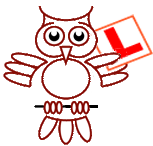 Autumn term is always a busy one for library staff involved in inductions and training, as we welcome new students and introduce them to the library and to online resources that they will use throughout their studies. However, our role does not end here because library staff are always available to provide training in information skills throughout the academic year. We can direct you to the best resources for your subject and help you to refine your search skills so you can find relevant, quality and current information and make effective use of it.
Autumn term is always a busy one for library staff involved in inductions and training, as we welcome new students and introduce them to the library and to online resources that they will use throughout their studies. However, our role does not end here because library staff are always available to provide training in information skills throughout the academic year. We can direct you to the best resources for your subject and help you to refine your search skills so you can find relevant, quality and current information and make effective use of it.
In addition to student sessions arranged with departments, our training programmes include scheduled sessions for which any UCL staff or student may book, drop-in sessions, and sessions for graduate students arranged in liaison with the Graduate School. We are also happy to assist on an individual basis and our dedicated Enquiry Desks exist specifically for this purpose.
Training is carried out across all UCL Libraries:
- Details of bookable and drop-in sessions at most of the central sites, including the Science and Cruciform libraries, are available at http://www.ucl.ac.uk/library/training/sessions
- The Royal Free Library has a regular programme of sessions on using biomedical databases and other resources, and is about to complete a popular series of sessions for biomedical graduate students covering all aspects of information skills with a session on ‘Plagiarism and Citing’ on 11 February. See http://www.ucl.ac.uk/medicalschool/rfhmedlib/uselib/training/infoskills for details.
by Angela Young
Natural history treasures
The 200th anniversary of Charles Darwin’s birth and the 150th of On the origin of species coincide with the addition of three of UCL’s natural history collections to UCL’s Library Catalogue, those of Sir Arthur Smith Woodward, the Malacological Society of London, and as reported in the last issue of librarynews, the Hertfordshire Natural History Society, which included Darwin in its membership.
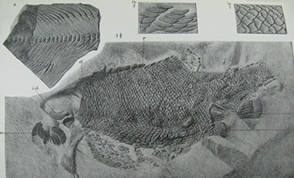 On Atherstonia australis and Ctenolates avus, two new fossil fishes from New South Wales by Arthur Smith Woodward (1902). 44th of 86 items bound together. [system number 1220745]
On Atherstonia australis and Ctenolates avus, two new fossil fishes from New South Wales by Arthur Smith Woodward (1902). 44th of 86 items bound together. [system number 1220745]
Smith Woodward was Keeper of the Geological Department of the British Museum from 1901-1924, a world expert on fossil fishes who wrote the monumental Catalogue of the fossil fishes in the British Museum between 1889 and 1901, and winner of a Royal Medal from the Royal Society and the Linnean Medal of the Linnean Society, among many other prestigious awards. UCL purchased his collection in 1945, the year after his death, and it has since been added to by contributions from Lady Woodward among others, so that it now comprises over 2500 works, most of which are in English. The most recent was published in 1968 and the earliest in 1739 but most date from the late nineteenth or early twentieth century.
Palaeontology and geology are the main subjects represented but works on anthropology, evolution, the origin of man, classification of species, zoology, palaeobotany and natural history also feature. Geographically the collection spans the globe: it contains guides and handbooks, reports of scientific expeditions to Africa, Australia, China, Europe and North and South America, correspondence, memoirs, classification and descriptions of fossils and newly discovered species, and catalogues of collections as well as descriptions of those in the British Museum and other institutions.
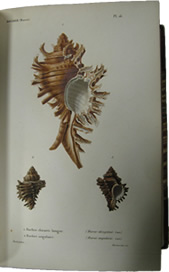 Spécies général et iconographie des coquilles vivantes par L. C. Kiener. Troisième Partie. Famille des canalifères (1873). Plate 16. [system number 638148]
Spécies général et iconographie des coquilles vivantes par L. C. Kiener. Troisième Partie. Famille des canalifères (1873). Plate 16. [system number 638148]
Many of these works contain letters and some are inscribed to Sir Arthur by the authors, among them Othniel Marsh and Edward Drinker Cope. Marsh and Cope were American palaeontologists whose heated rivalry from the 1870s onwards was known as ‘The Bone Wars’. This was a period in which Stegosaurus and Diplodocus were discovered, and which led to decades of fossil speculation in North America when many other dinosaur remains were found. Works by Richard Owen, who coined the term ‘dinosaur’, Thomas Henry Huxley, biologist, anatomist, champion of scientific education and known as ‘Darwin’s bulldog’ because of his vigorous support for On the origin of species, are also included as well as those by Darwin himself. One of Darwin’s less famous but still important works in the collection, The formation of vegetable mould through the action of worms with observations on their habits, was published just before his death in 1888.
Smith Woodward was a central figure in the study of palaeontology in his time, serving as Secretary to the Palaeontological Society from 1900-1934, President of the Geological Association from 1904-1906 and President of the Geological Society from 1914-1916. To browse the collection go to http://library.ucl.ac.uk and type ' Smith Woodward ' as the classmark in a 'Multi-field' search.
The 300 works in the Malacological Society of London’s Collection have been at UCL since 1930 with the 43 published before 1700 kept in the Special Collections Strong Room. The earliest, Prosopopoeiae animalium, appeared in 1552. In the main collection popular works such as Ponds and rock pools and The common shells of the sea shore sit alongside early editions of learned works by Lamarck, Cuvier, Linnaeus and Louis Agassiz.
The major focus of the collection is on molluscs but mineralogy, botany and gems are also included. Voyages of discovery represented include that of HMS Nassau to the Straits of Magellan in the decade before the more famous Challenger Expedition of the 1870s, and the cruises of the U.S. Geodetic Survey Ship in the Western Atlantic and the Caribbean at a time when what is now called ‘oceanography’ was known as ‘thalassography’. Apart from these, Britain and the British Empire are the areas most represented. Most of the works are in English but some are in other European languages. The range of illustrations is most impressive, from early woodcuts to copperplate engravings, vivid watercolours of creatures from all parts of the animal kingdom, especially molluscs and shells, and early photographs. To browse the collection go to http://library.ucl.ac.uk and type ' Malacological Society ' as the classmark in a 'Multi-field' search.
by Kylia Eastwell and Bill Lehm
Launch of UCL Archives Database
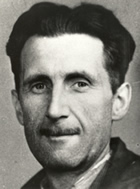 UCL Archives, the online database of archive holdings for UCL Special Collections and the School of Slavonic and East European Studies was launched on Monday 16 February 2009. The database will provide access to the aforementioned archive collections, enabling users to search the holdings of Special Collections and SSEES catalogues and handlists. Highlights featured in UCL Archives will include the catalogue of the George Orwell Papers, from which the accompanying image is sourced (ref: ORWELL/T/2/D/30). Details of collections of other notable individuals including the human geneticist Sir Francis Galton (1822-1911), and politician Hugh Gaitskell (1906-1963) can also be found.
UCL Archives, the online database of archive holdings for UCL Special Collections and the School of Slavonic and East European Studies was launched on Monday 16 February 2009. The database will provide access to the aforementioned archive collections, enabling users to search the holdings of Special Collections and SSEES catalogues and handlists. Highlights featured in UCL Archives will include the catalogue of the George Orwell Papers, from which the accompanying image is sourced (ref: ORWELL/T/2/D/30). Details of collections of other notable individuals including the human geneticist Sir Francis Galton (1822-1911), and politician Hugh Gaitskell (1906-1963) can also be found.
The new database can be accessed at http://archives.ucl.ac.uk
by Zoe Browne
Profile - Gill Long, User Services Librarian, UCL SSEES Library
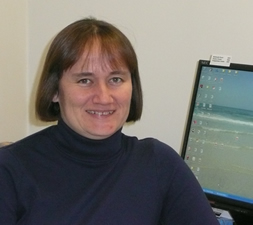 My first brush with librarianship came at the tender age of six, when I was given responsibility for tidying the book corner at my infant school. The job entitled me to wear a red enamel “librarian” badge on my school tie – and so, to everyone’s amusement now, my first school photograph provides incontrovertible evidence of my vocation!
My first brush with librarianship came at the tender age of six, when I was given responsibility for tidying the book corner at my infant school. The job entitled me to wear a red enamel “librarian” badge on my school tie – and so, to everyone’s amusement now, my first school photograph provides incontrovertible evidence of my vocation!
My real interest in librarianship began in 1994 with a one-year graduate traineeship at SSEES Library, which I applied for after completing my degree in German and Russian at the University of Bath. Working in an academic environment appealed to me and I was delighted to find a job where I could use my languages as well.
After gaining a postgraduate diploma in Information and Library Studies at the University of Wales, Aberystwyth in 1996, I returned to SSEES to work on a temporary cataloguing project, before heading off to Germany to try something completely different - translating computer hardware manuals for the electronics firm Siemens.
A couple of years later I was back at SSEES again, initially as a senior library assistant, and since October 2004 in my current role as User Services Librarian. The first year of my current job was certainly a busy time. As SSEES prepared for its move out of Senate House to Taviton Street, I found myself helping to plan the layout of the public areas in the new Library, poring over endless pages of calculations to ensure that our collections would fit into the new space, supervising the labelling and packing of library stock and other equipment, liaising with builders and furniture suppliers - and not least ensuring that our library users, particularly MA students, were offered every assistance during what was inevitably a period of great disruption.
Three years on SSEES is well and truly settled into its stunning new home – and the Library is busier than ever before. My day-to-day duties as User Services Librarian are many and varied. I deal with a wide range of enquiries regarding use of the Library, membership, overdue books and fines. I manage the Library’s issue desk, the User Services section and a team of evening and Saturday assistants. I edit the SSEES Library web pages and oversee the running of the main UCL SSEES web site as well. Another aspect of my work involves user training and I teach information skills to MA students as part of the ‘Research Skills for Area Studies’ course. Finally I manage the Library’s audio-visual service. We have a huge collection of Russian and East European feature films, documentaries and recent news broadcasts, many of which we have recorded via satellite. UCL students and staff can watch any of these materials in the Multimedia Room in UCL SSEES Library. For more information, see the catalogue on our web site.
by Gill Long
Launch of Economists Online
SEE AND BE SEEN: Bringing together Europe’s leading research
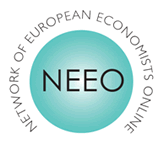 Economists Online aims to increase the worldwide visibility of economics research. It is a cross-searchable portal with a focus on quality economics research results. The portal offers faceted search technology and includes the individual profiles of hundreds of leading authors and their comprehensive publication lists, with links to many full texts free of charge. Over 300 researchers from 6 top economics institutions (The London School of Economics, Tilburg University, Erasmus University Rotterdam, Maastricht University, Université Libre de Bruxelles and Katholieke Universiteit Leuven) are currently feeding this first phase of the service.
Economists Online aims to increase the worldwide visibility of economics research. It is a cross-searchable portal with a focus on quality economics research results. The portal offers faceted search technology and includes the individual profiles of hundreds of leading authors and their comprehensive publication lists, with links to many full texts free of charge. Over 300 researchers from 6 top economics institutions (The London School of Economics, Tilburg University, Erasmus University Rotterdam, Maastricht University, Université Libre de Bruxelles and Katholieke Universiteit Leuven) are currently feeding this first phase of the service.
Initial testing has already shown that the service is providing more open access full text and bibliographic records for participating researchers than any of the current generic or economics-specific search engines or systems.
Economists Online will act as a showcase for researchers and their Departments / Schools / Institutions, and in the second phase the service will grow to cover access to the direct research results of over 800 researchers in some 20 prestigious economics institutions (e.g. the universities of Oxford, Warwick and Carlos III Madrid). Additional functionality will include: full text searching, automated enrichment of bibliographies with Journal of Economic Literature (JEL) codes and metadata of references using text mining technology, multilingual JEL browsing in English, French, German and Spanish, multilingual searching (e.g. search in French and find English publications), RSS feeds and usage statistics.
Research from the UCL Department of Economics will be available from the finished version of the portal in the autumn. Several members of staff from UCL Library Services are involved in making this a reality, as well as being responsible for the awareness and dissemination activities for the project as a whole, and providing IPR expertise.
Economists Online is available at: http://www.economistsonline.org
by Kieron Jones
Spotlight on... UCL Institute of Orthopaedics Library
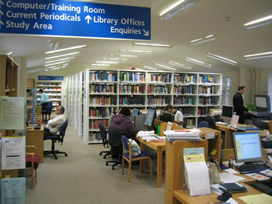 The UCL Institute of Orthopaedics Library is located in spacious and green surroundings at Stanmore. It provides a joint library service with specialist collections for students, staff and researchers at UCL’s Institute of Orthopaedics and Musculoskeletal Science and the Royal National Orthopaedic Hospital NHS Trust. The IOMS and the RNOH have worked in partnership since the 1940s to provide innovative treatments and devices for a wide range of complex and rare neuro-musculoskeletal diseases and conditions. The RNOH was founded in 1905 through the amalgamation of three specialist orthopaedic hospitals in London. It provides training for 20% of the orthopaedic surgeons in the UK. Research activity on the Stanmore campus includes biomedical engineering, tissue regeneration, clinical orthopaedics, and performance/rehabilitation.
The UCL Institute of Orthopaedics Library is located in spacious and green surroundings at Stanmore. It provides a joint library service with specialist collections for students, staff and researchers at UCL’s Institute of Orthopaedics and Musculoskeletal Science and the Royal National Orthopaedic Hospital NHS Trust. The IOMS and the RNOH have worked in partnership since the 1940s to provide innovative treatments and devices for a wide range of complex and rare neuro-musculoskeletal diseases and conditions. The RNOH was founded in 1905 through the amalgamation of three specialist orthopaedic hospitals in London. It provides training for 20% of the orthopaedic surgeons in the UK. Research activity on the Stanmore campus includes biomedical engineering, tissue regeneration, clinical orthopaedics, and performance/rehabilitation.
The library was refurbished in 2005, following the formal merger of the two small libraries which served the IOMS and the RNOH. The result was a greatly enhanced space with more windows, improved lighting, additional computing capability, more comfortable seating, and a designated quiet study area. It is located on the first floor of the Sir Herbert Seddon Teaching Centre on the Stanmore campus. During the first year in its new space use of the library doubled and continues to grow despite the increasing access to electronic information.
A library user recently described the library as “Orthopaedic Heaven” for the content of its print and electronic resources. These include 140 current journal subscriptions comprised mainly of specialist titles in orthopaedics, musculoskeletal science and rehabilitation. The library has over 10,000 volumes and a substantial multimedia collection on topics such as anatomy and orthopaedic surgical techniques. Networked computers for both UCL and NHS users are available in the main area of the library and in the training room. Three more cluster PCs will be added soon for a total of 9 in the library; additional PCs are located in the nearby IOMS Student Centre. RNOH users and library visitors can access UCL’s extensive electronic resources via two walk-in PCs.
Library inductions are regularly scheduled for new UCL and RNOH staff and students and are also provided on request. Further information skills training on searching biomedical and health information is also available for small groups or individuals. Other services include interlibrary loans and mediated literature searching. Library staff provide teaching and learning support for the iBSc course in Orthopaedic Science and the multiprofessional MSc course in Musculoskeletal Science.
The library has a combined enquiry/issue desk which is staffed throughout its opening hours of 09:00-19:00 on Tuesday and Thursday, and 09:00-17:30 on Monday, Wednesday and Friday. Further information about the library is available at http://www.ucl.ac.uk/library/sites/orthopaedics and enquiries can be made by telephone on 020 8909 5351 or email to orthlib@ucl.ac.uk.
Historical collections
In recent years a branch of the Institute of Orthopaedics Library closed at the Central London outpatient branch of RNOH. Newer titles were moved to the library collection at Stanmore. Several hundred titles published from the late 17th to the early 20th century were transferred to UCL Special Collections and can be viewed by appointment (see http://www.ucl.ac.uk/library/special-collections for more information). These include early works on musculoskeletal diseases, fractures, orthopaedic surgery, military surgery, treatment of wounds, amputation, and the manufacture of artificial limbs, rehabilitation and exercise. A full title list of this collection can be retrieved from the UCL library catalogue by entering the search term orthopaedics sc (i.e. special collection) into the “Quick Search” box.
Many further historical and non-current books and journals were transferred to UCL Library Services' Stores from the closed branch of the Orthopaedics Library. By submitting a Store Request library users can have these items delivered to their site library the next day via this service.
by Julie Noren
 Top of page Top of page
Issue 21 - Spring term, 2009
|

